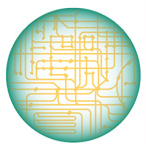FUNDING: Integrative Computational Tools for Systems Biology Research
Summary
The DOE Office of Science (SC) program in Biological and Environmental Research (BER) is receiving applications to support research on the development of bioinformatics and computational applications within the Biological Systems Science Division’s (BSSD) Genomic Science Program (GSP) mission space. For this Funding Opportunity Announcement (FOA), BSSD solicits applications for the development of novel and innovative computational approaches or applications that have the potential to transform or advance systems biology research of plant and microbial systems relevant to DOE missions in energy security and resilience.
The BER program supports basic research to understand the fundamental nature of biological processes relevant to DOE energy and environmental mission goals. Within BER, GSP supports systems biology research on microbial, plant, plant-microbe interactions, and environmental microbial communities to address DOE’s mission in sustainable bioenergy development. Understanding and harnessing the metabolic and regulatory networks of plants and microbes will enable their design and re-engineering for improved energy resilience and sustainability, including advanced biofuels and bioproducts.
The widespread adoption of high-throughput, multi-omic techniques has revolutionized biological research, enabling a broader view and deeper understanding of cellular processes and the biological systems they drive. In pursuit of predictive modeling and genome-scale engineering of complex biological systems important for bioenergy, the research supported by GSP generates vast amounts of complex omics and other data from a wide range of analytical technologies and experimental approaches. These data span multiple spatiotemporal scales, reflecting the organizational complexities of biological systems, and present significant computational challenges for identifying causal variants that influence phenotype. Accurate modeling of the underlying systems biology depends on surmounting those challenges. The collective characterization and quantification of pools of biological molecules (genomics, transcriptomics, proteomics, metabolomics) and their systems processes are essential to construct coherent knowledge of the systems underpinning and governing the diverse phenomics and functioning of plants, microbes, and their communities. Such characterizations necessitate the ability to combine datasets of heterogeneous types, integrated over time and space, and to represent emergent relationships in a coherent framework.
The breadth of data types and the complexities inherent in the integration of different data layers present significant conceptual and implementation challenges. New algorithms for incorporating data derived from innovations in genomics, molecular imaging, structural biology, and spectroscopy are needed to work effectively with, and glean useful insights from, complex, integrated molecular, omics data. Computational simulation and rigorous hypothesis testing depend on the ability to incorporate multiple experimental/environmental conditions and associated metadatasets.
Through this FOA, BSSD solicits applications that propose innovative computational solutions that can integrate large, disparate data types from multiple and varied sources, and/or the integration of data to achieve coordinated knowledge or integration of knowledge to decipher relationships of biological systems of relevance to DOE. Novel computational tools and analytical approaches of large-scale, multimodal, and multiscale data that will lead to scalable solutions for omics analysis, data mining, and knowledge extraction from complex data sets (experimental and calculated) are sought. Bioinformatics tools or computational applications that are interoperable and effective for computationally intensive data processing and analyses for systems-level investigations are desirable. Also encouraged is the enhancement of existing software or approaches that are demonstrated to be in broad use by the genomics community, to aid the interpretation of multimodal data for environmental sciences.
Research topics appropriate for this FOA include, but are not limited to, the development of novel computational, bioinformatics, statistical, algorithmic, analytical approaches, toolkits, or software for:
- The derivation of a systems-level understanding from orthogonal datasets of microbial cultures and communities, via the development of integrated networks and computational models.
- Data mining and comparative analysis across large-scale datasets to infer microbial community composition and interactions or microbial community analysis to handle a wide range of functional genomics data types.
- Data mining and comparative plant genomics or multi-omics to facilitate gene function discovery, investigate evolutionary relationships at the genome scale, and/or identify candidate gene and regulatory networks that influence plant adaptability to the environment.
- Development of innovative computational strategies to enhance, scale, and optimize the management and processing throughput of large, complex, and heterogeneous biological data generated across scales for integration and interpretation.
- Data integration approaches and new software frameworks for management and analysis of large-scale, multimodal, and multiscale data that enhance the transparency of approach, effectiveness, and efficiency of data processing.
- The integration of data across any two or more of biochemical and biophysical measurements, omics data, and image data to provide insights into fundamental biological processes and to identify novel biological paradigms, for example but not limited to:
- Convert information from images to enable integration with other data types
- Integrate genomic and biophysical/biochemical data
BER places a high priority on ensuring that any scientific software developed under its research awards is made freely available, easy to use, open access, and user-friendly. These objectives may be met through integrating software into the DOE Systems Biology Knowledgebase (KBase) computational platform. The National Microbiome Data Collaborative (NMDC) portal makes data streams freely available to test software. Applications could include plans to integrate software into the KBase computational platform or include plans to test the software on data streams available on the NMDC portal.
The following topics are not within the scope of this FOA: Applications pertaining to the analyses of animal or human datasets, development of data repositories, and projects exclusively focused on data generation.
Funding Announcement Detail
- Funding Announcement Number: DE-FOA-0002878
- Funding Announcement: PDF
- Submission Deadline for Pre-applications: January 10, 2023
- Pre-application Response Date: January 26, 2023
- Submission Deadline for Applications: March 28, 2023
- Technical Contacts: Ramana Madupu, ramana.madupu@science.doe.gov
